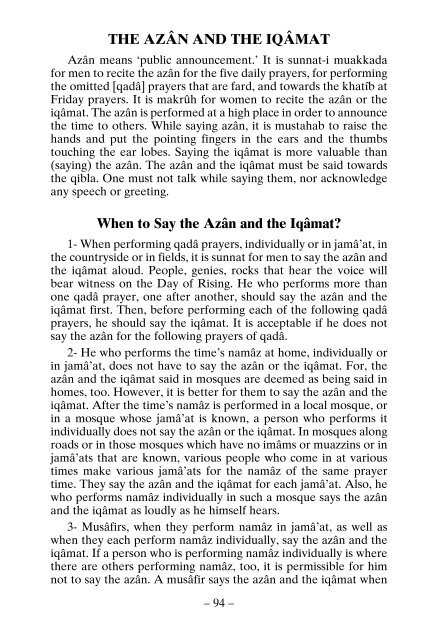Book of Namaz
You also want an ePaper? Increase the reach of your titles
YUMPU automatically turns print PDFs into web optimized ePapers that Google loves.
THE AZÂN AND THE IQÂMAT<br />
Azân means ‘public announcement.’ It is sunnat-i muakkada<br />
for men to recite the azân for the five daily prayers, for performing<br />
the omitted [qadâ] prayers that are fard, and towards the khatîb at<br />
Friday prayers. It is makrûh for women to recite the azân or the<br />
iqâmat. The azân is performed at a high place in order to announce<br />
the time to others. While saying azân, it is mustahab to raise the<br />
hands and put the pointing fingers in the ears and the thumbs<br />
touching the ear lobes. Saying the iqâmat is more valuable than<br />
(saying) the azân. The azân and the iqâmat must be said towards<br />
the qibla. One must not talk while saying them, nor acknowledge<br />
any speech or greeting.<br />
When to Say the Azân and the Iqâmat?<br />
1- When performing qadâ prayers, individually or in jamâ’at, in<br />
the countryside or in fields, it is sunnat for men to say the azân and<br />
the iqâmat aloud. People, genies, rocks that hear the voice will<br />
bear witness on the Day <strong>of</strong> Rising. He who performs more than<br />
one qadâ prayer, one after another, should say the azân and the<br />
iqâmat first. Then, before performing each <strong>of</strong> the following qadâ<br />
prayers, he should say the iqâmat. It is acceptable if he does not<br />
say the azân for the following prayers <strong>of</strong> qadâ.<br />
2- He who performs the time’s namâz at home, individually or<br />
in jamâ’at, does not have to say the azân or the iqâmat. For, the<br />
azân and the iqâmat said in mosques are deemed as being said in<br />
homes, too. However, it is better for them to say the azân and the<br />
iqâmat. After the time’s namâz is performed in a local mosque, or<br />
in a mosque whose jamâ’at is known, a person who performs it<br />
individually does not say the azân or the iqâmat. In mosques along<br />
roads or in those mosques which have no imâms or muazzins or in<br />
jamâ’ats that are known, various people who come in at various<br />
times make various jamâ’ats for the namâz <strong>of</strong> the same prayer<br />
time. They say the azân and the iqâmat for each jamâ’at. Also, he<br />
who performs namâz individually in such a mosque says the azân<br />
and the iqâmat as loudly as he himself hears.<br />
3- Musâfirs, when they perform namâz in jamâ’at, as well as<br />
when they each perform namâz individually, say the azân and the<br />
iqâmat. If a person who is performing namâz individually is where<br />
there are others performing namâz, too, it is permissible for him<br />
not to say the azân. A musâfir says the azân and the iqâmat when<br />
– 94 –

















